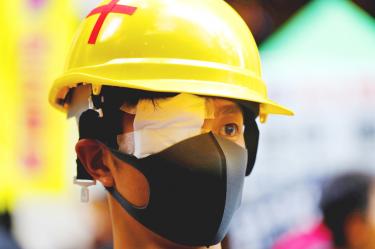Heavy rain fell on tens of thousands of umbrella-toting protesters yesterday as they marched from a packed park and filled a major road in Hong Kong, where mass pro-democracy demonstrations have become a regular weekend activity this summer.
Organizers said they hoped that the assembly would be peaceful, which would make for a rare calm weekend in a months-long movement that has been marked by violent clashes with police.
Law enforcement officers were keeping a low profile, with no riot police seen from the procession’s main routes.
“We hope that there will not be any chaotic situations today [yesterday],” organizer Bonnie Leung (梁穎敏) said. “We hope we can show the world that Hong Kong people can be totally peaceful.”
Leung’s group, the Civil Human Rights Front, has organized three massive marches in Hong Kong since June.
However, the protest movement has been increasingly marked by clashes with police as demonstrators vent their frustrations over what they perceive to be the Hong Kong government’s blatant refusal to respond to their demands.
“Peace is the No. 1 priority today,” said Kiki Ma, a 28-year-old accountant participating in the march. “We want to show that we aren’t like the government.”
While police had granted approval for the rally, they did not approve an accompanying march.
Demonstrators nevertheless fanned out and filled the streets, as there was not enough space at the designated assembly area.
Public transit trains did not stop at stations near the assembly because of overcrowding.
Harley Ho, a 20-year-old social work student who attended the rally, said that protesters were undeterred by the rain and would not rest until their demands were met.
“We will stand here, we will take action until they respond to us,” Ho said. “In the rain, our spirit becomes stronger.”
In Beijing, You Wenze (尤文澤), a spokesman for China’s ceremonial legislature, condemned statements from US lawmakers supportive of Hong Kong’s pro-democracy movement.
You called the lawmakers’ comments “a gross violation of the spirit of the rule of law, a blatant double standard and a gross interference in China’s internal affairs.”
He said that Hong Kong’s 7.5 million people and the Chinese population as a whole rejected the actions of a “very small group of violent protesters” as well as “any interference of foreign forces.”
You did not mention any specific lawmaker, but numerous US lawmakers, including US House of Representatives Speaker Nancy Pelosi, have affirmed the US’ commitment to human rights and urged the Hong Kong government to end the standoff.
The US Congress also has the power to pass legislation affecting Hong Kong’s relationship with the US in ways that could further erode the territory’s reputation for stability and rule of law.
That includes the recent reintroduction of the US’ Hong Kong Human Rights and Democracy Act, which would among its other provisions require the US secretary of state to issue an annual certification of Hong Kong’s autonomy to justify special treatment afforded to the territory.
More directly, US President Donald Trump could simply issue an executive order suspending Hong Kong’s special trading status with the US, a move that could have a devastating effect on the local economy at a time when Beijing and Washington are engaged in a trade dispute.
A former British colony, Hong Kong was returned to Beijing in 1997 under the framework of “one country, two systems,” which promised residents certain democratic rights not afforded to people in mainland China.
However, some Hong Kongers have accused the Chinese Communist Party-ruled central government of eroding their freedoms in recent years.
The protest movement’s demands include the resignation of Hong Kong Chief Executive Carrie Lam (林鄭月娥), democratic elections and an independent investigation into police use of force.
Members of China’s paramilitary People’s Armed Police force have been training for days across the border in Shenzhen, including yesterday morning, fueling speculation that they could be sent in to suppress the protests.
The Hong Kong police have said that they are capable of handling the protests.
Source: Taipei Times - 2019/08/19





















